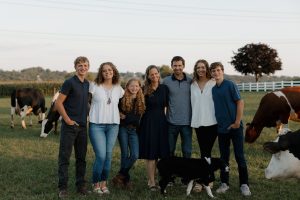
Originally published in Hoard’s Dairyman
For Kendra Nissley and her husband, Jeff, of Jubilee Dairy, LLC in Dauphin County, Pennsylvania, the word “sustainability” takes on a lot of meaning. With every business decision they make, they intentionally think about the next generation to ensure their farm remains sustainable over the long haul – from a profitability standpoint to the land and environment around them to a healthy work-life balance for their family.
They own their dairy herd of about 180 cows and 215 heifers, and they rent the farm and land from her husband’s parents. With their five kids all involved in the dairy operation in some way, the Nissleys see growth potential in some of the value-added avenues they are pursuing. Jubilee Heritage Cheese LLC, their small value-added cheese business, focuses mainly on cheese curds. They have also experimented with yogurt and recently started direct marketing beef from their cheese shed as well.
“Our dairy is our powerhouse. The cheese is a very small percentage of revenue, and we’ve just added the beef in the last 18 months. We’ve had some wonderful interest in frozen beef as well as dry products like jerky and beef sticks,” Kendra shared. “It has great potential to grow, but that has to be in sync with our priorities, our family needs and sustainability for us.”
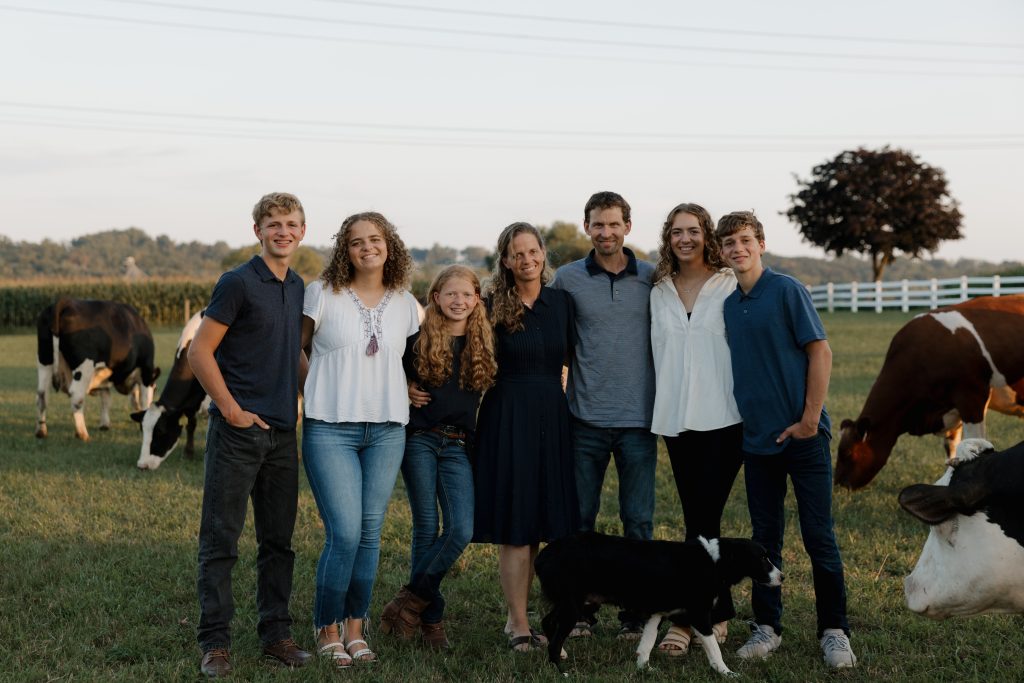
Value-Added Opportunities for the Next Generation
As Kendra and Jeff brainstormed ways they could create future opportunities for their family, the value-added space seemed like it could open doors in the future, especially with limited land availability.
“Initially, we began cheesemaking because I wanted to create other businesses to sustain more family. There’s kind of a point of diminishing returns where land can only sustain so many farm families on a certain parcel or amount of acreage,” Kendra said. “I began to wonder what it could look like to have different businesses to support our family as my children grow. Or if they’re interested in returning to the farm, could there be additional revenue streams we could tap into? That was part of the impetus for beginning the cheesemaking journey.”
While Kendra works with local cheesemakers and is actively involved in the cheesemaking process, she’s also responsible for several other aspect of the dairy operation – making it difficult to devote large amounts of time on marketing and branding her products.
“There are local cheesemakers who take our milk and have allowed me to help make the recipes, mix ingredients with the curd and be involved in the cheesemaking process,” she shared. “But with any small value-added business, especially dairy products, I think the farmer becomes the catch-all. I feed the calves, I milk the cows, I help to make the cheese, I market the cheese, and I interact with the consumer. There’s so much energy and intensity exhausted into milk production and getting a quality cheese product made. For me, the marketing often gets second-class effort.”
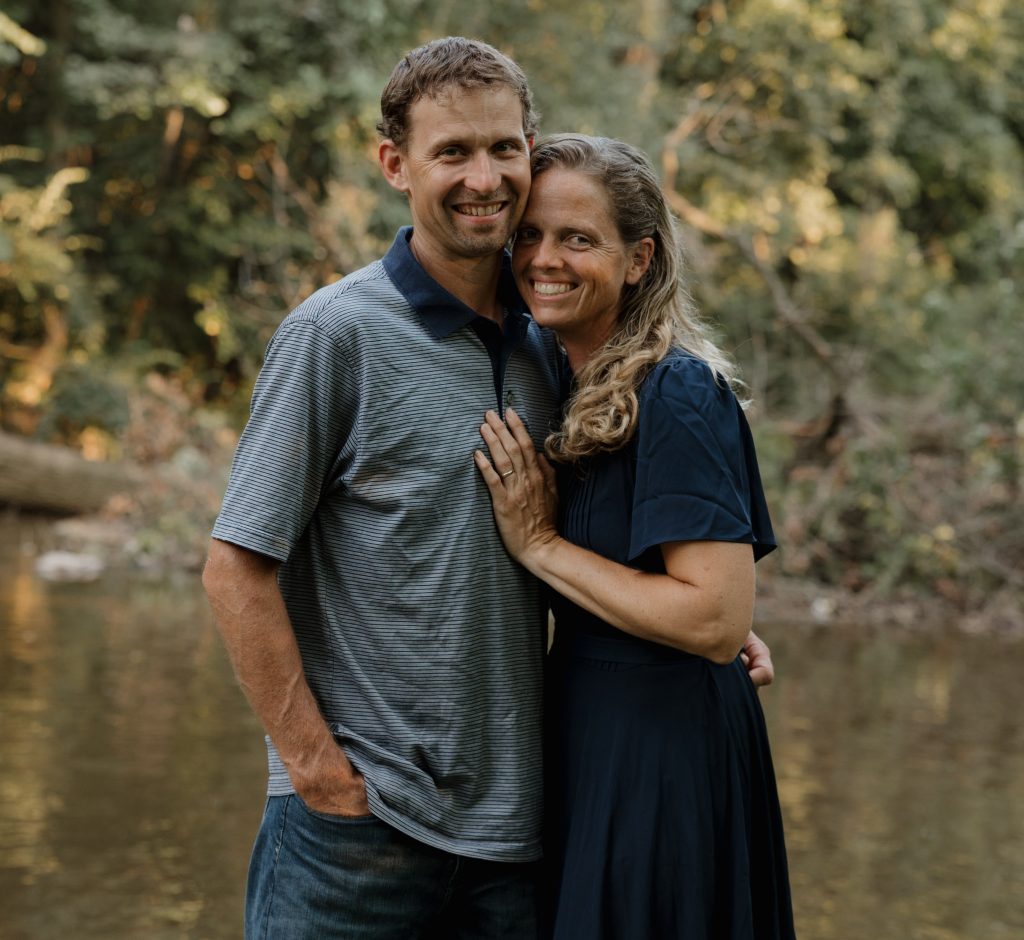
To help prioritize the marketing and branding process for some of her value-added products, Kendra recently received a Marketing, Branding and Labeling grant through the Center for Dairy Excellence that allows her to work with business consultants who specialize in helping food businesses grow. Her goal is to take advantage of an outside perspective to help her enhance their brand and better connect with their community.
“I’m really excited about this marketing grant, because I believe our consultants (Kitchen Table Consultants) really have their head around what it takes to interface with the consumer and improve on the look of an attractive brand to connect with the community,” Kendra added. “I need a fresh pair of eyes and people to say, ‘Did you try this?’ Maybe explain our logo a little, encourage us to try this kind of signage, and just give a fresh perspective. It’s also someone who can give us the nudge to invest in marketing, because that’s one of the things that falls by the wayside.”
If the next generation is interested in the cheesemaking side of their business, Kendra wants to make sure the opportunity is there for them to pursue – as long as it remains sustainable to their family’s happiness and priorities.
“It would be fun to grow the business a little bit. We kind of have it on autopilot to see if we might want to dive in and create more of a revenue source as the kids grow. But that takes work, too. So this is the first little step towards seeing if anything like that might be feasible,” Kendra explained. “We want to create space for future generations who might want to pursue some agriculture involvement and not have it limited by a one-business type of farm.”
Environmental Stewardship with the Future in Mind
Kendra and Jeff are also passionate about protecting the farmland and environment around them. They graze as much as they can in the summer months, and it all connects to their mission of preserving and creating opportunities for the next generation.
“Our children are the tenth generation farming the region, and we do not take that lightly. We have a history of faith and farming. We’re seeing the need to be very strategic in how we farm in order to maintain a healthy, vibrant land for the generations to come,” she said. “There needs to be more deliberate care taken to make sure we’re stewarding our resources and water sources well and the productivity of our land, including how we manage our cropping, our manure application, and some of the soil health issues.”
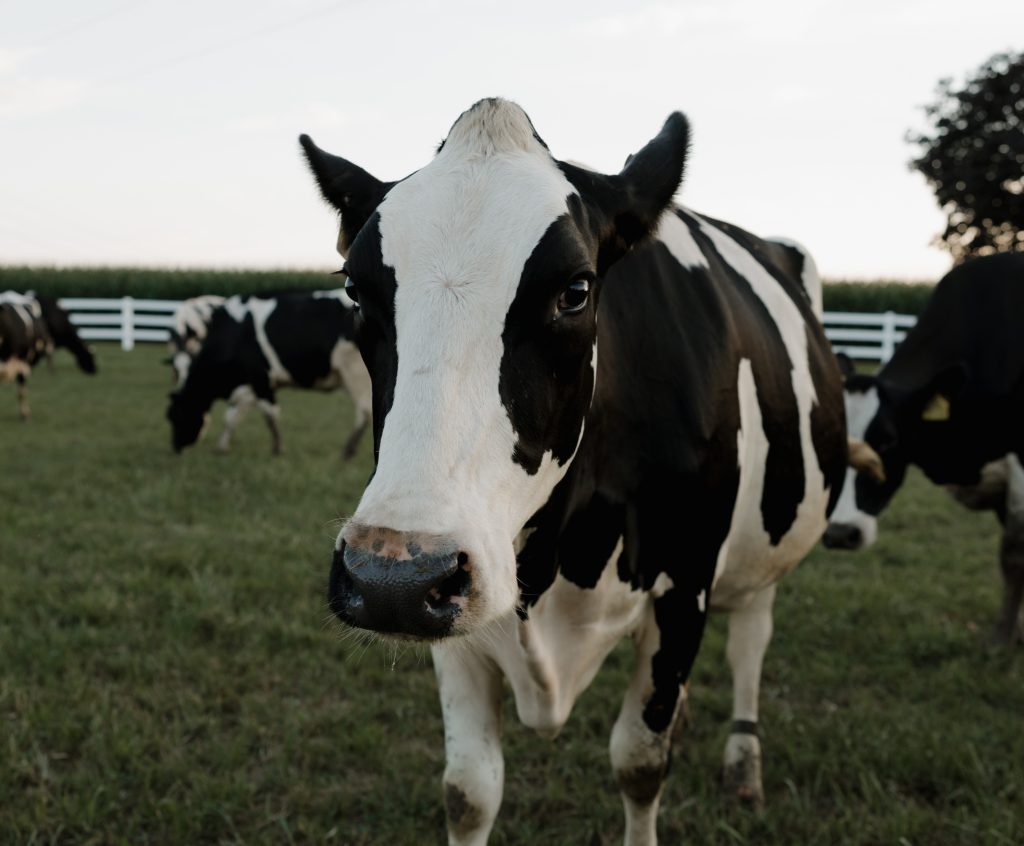
The Nissleys have received grants from their local Conservation District to invest in sustainability projects for the creek in their back meadow. They also work closely with The Chesapeake Bay Foundation and The Pennsylvania State University to focus on stream bank restoration. They recently received another grant to initiate some best management practices (BMPs) such as a compost pile, a waterer in the meadow, and another pad for heifers to feed on in the meadow.
“We’re going to be starting this spring with those projects, so that’s really where our heart is: to make this farm sustainable for the generations to come. Even though it’s not our land, my husband’s parents have done a really good job giving us some freedom to pursue what we’re passionate about.”
Their passion for environmental stewardship also allows them to build a deeper connection with the community around them and build trust with consumers who might be purchasing their dairy products.
“The consumer wants to know we’re doing our best to care for our animals, to care for the land, to care for the employees who are working for us, and to make sure the resources around us are handled with the future in mind,” she added. “Whether that’s planting trees or working on restoring part of a stream bank, we’ve been really passionate about those things.”
Employee Management, Community and Healthy Family Life
Beyond the profitability of their business and the vitality of the land around them, Kendra says the sustainability and satisfaction of their family life is equally as important to them. To create a healthy work-life balance, the Nissleys employ about 20 individuals, both part-time and full-time, which is a larger team than many dairy farms their size.
“We have worked really hard to make farming sustainable for our family, and that’s why we’ve hired a pretty strong team of employees to ensure our family does not get burned out. That means some sacrifices on the revenue end because really hard, focused work can be very profitable. But we don’t believe it’s sustainable in the long run for relationships or family systems,” she explained. “[Our kids] seem to cherish their farming heritage and seem to really enjoy being part of our family farm. That’s the sustainability we’re looking for. They need to see it done in a healthy and balanced way.”
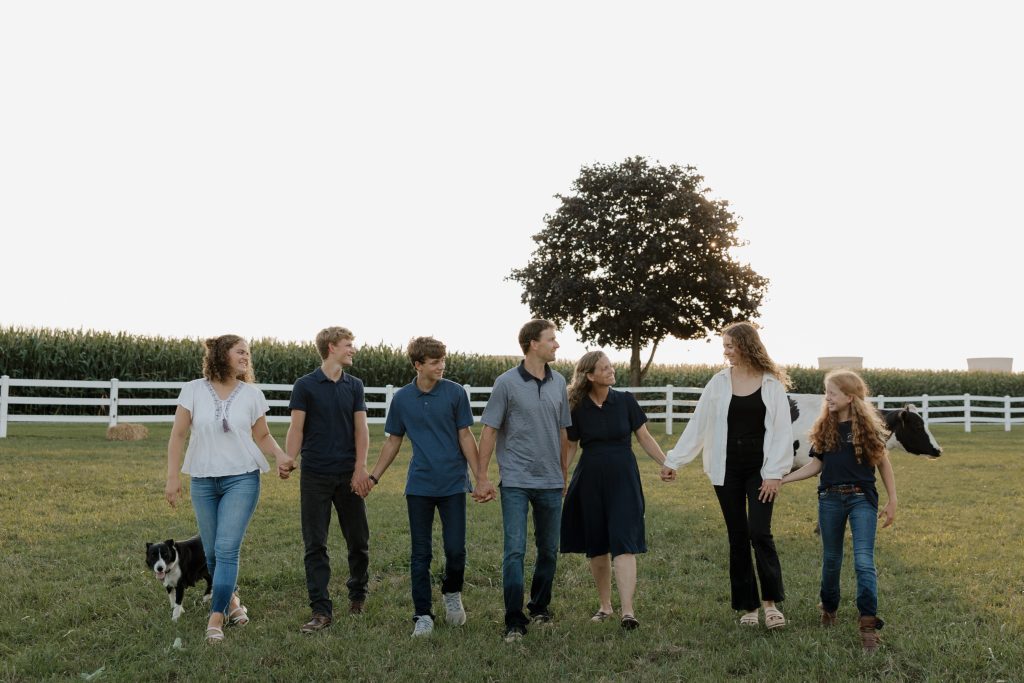
Kendra also finds value in building a sense of community and learning from others. Her ability to prioritize relationships has not only strengthened their family, but it has actually helped improve their dairy business. Through a Profit Team grant with the Center for Dairy Excellence that they received years ago, the Nissleys have built a trusted team of advisors who they communicate with to this day about strategic decisions at the farm level.
“The Profit Team was extremely beneficial for us. We really struggled when we started dairy farming not only because of our inexperience, but because of milk prices in 2008 and the inability to really get a handle on our herd. We just weren’t doing well,” Kendra shared. “That Profit Team was literally our lifeline in those darker days. When those people sat around the table with us, it was like a breath of fresh air. We said, ‘Yes, these folks understand.’ That was so important for us. Without the Profit Team, it would have been really hard in those early days to have hope that we could continue.”
With different advisors around the table to help them find bottlenecks, their veterinarian was able to share his perspective, their nutritionist helped them look at rations, and their facilitator made sure everybody had a voice and they were all collaborating.
“There is so much wisdom in a multitude of counselors. I’m not sure that any human being is capable of really understanding a situation fully without others around him or her to give their perspective. There’s so much strength in working together,” Kendra said. “One man might be able to solo pilot it, but there is so much fullness in being able to work with people who have your best interests in mind.”
From their value-added products and commitment to environmental stewardship to the connections they are forging with their family, employees and advisors, Kendra finds fulfillment being a farmer that her community can truly trust.
“The most fulfilling part is when the local community comes to us and says ‘thank you’ for having a high-quality product from a farmer we can trust. That relationship is invaluable. The future of family farming involves creating a face to the local farmer in order to keep that trust and communication flowing with consumers,” Kendra added. “There’s so much misinformation about how we farm and why we farm. I feel really rewarded building that trust in our community by having a high-quality local product to market.”
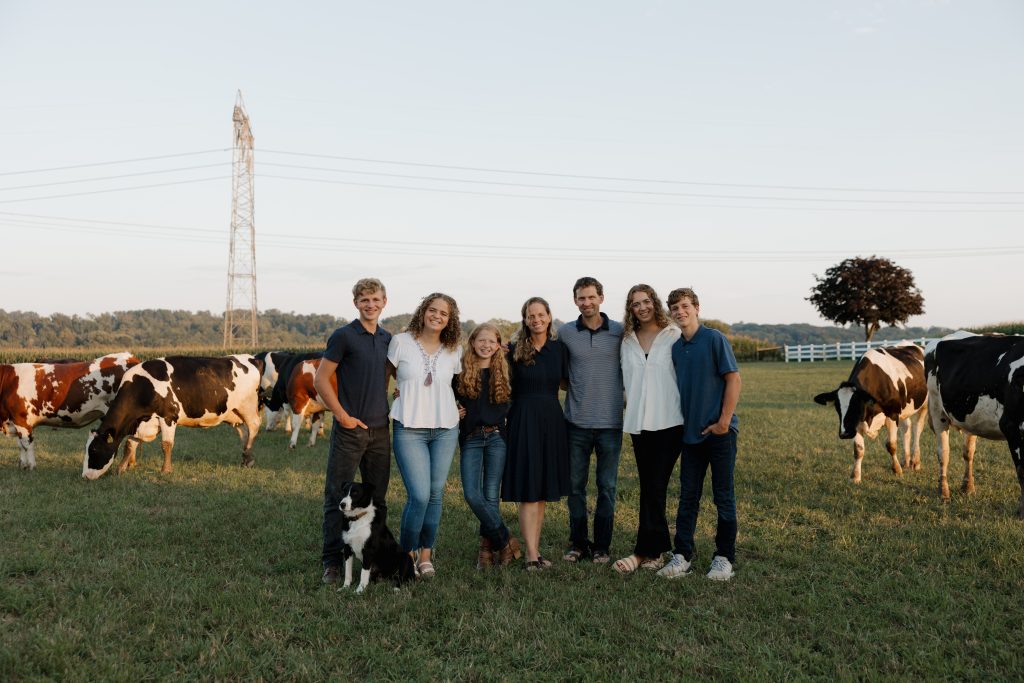
To learn more about grant opportunities available through the Center for Dairy Excellence, visit www.centerfordairyexcellence.org or email Melissa Anderson.

